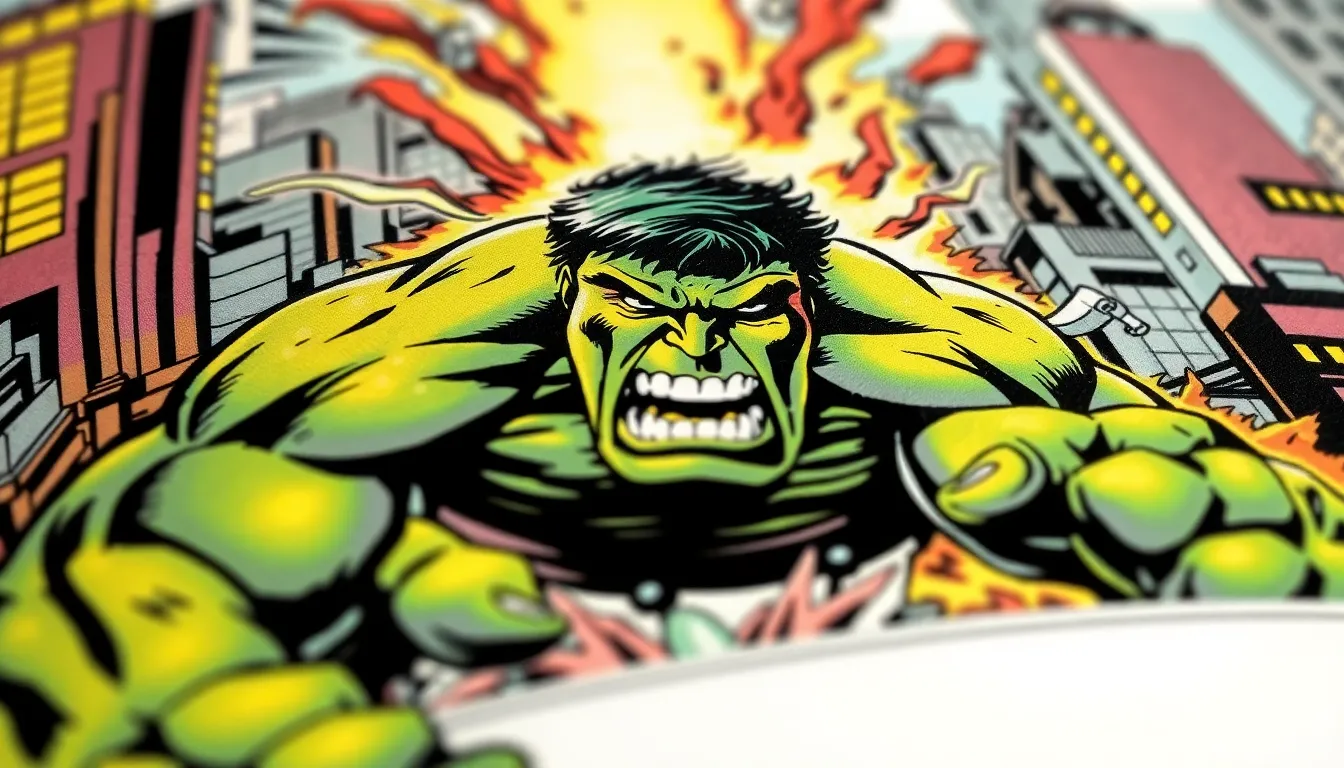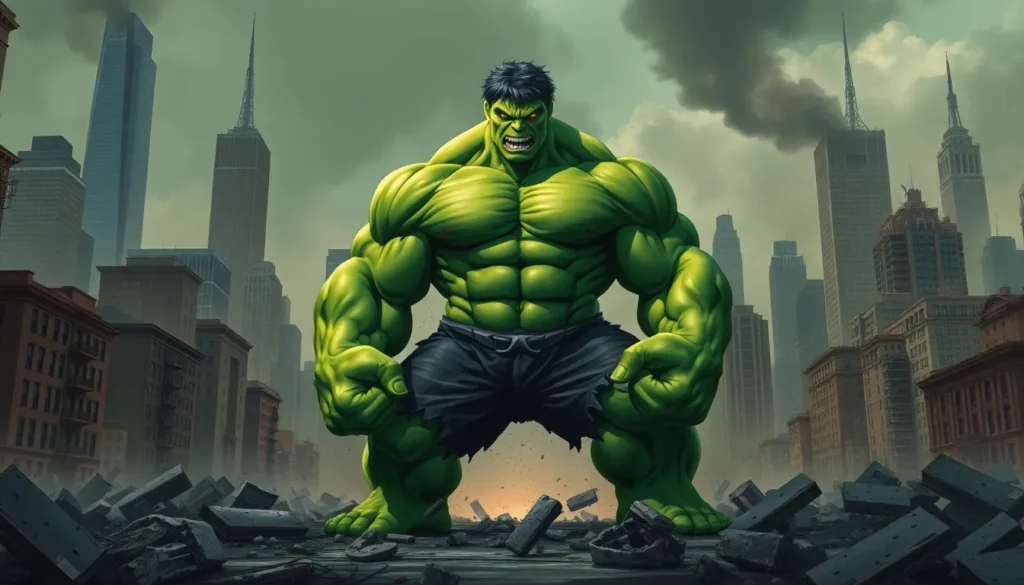When it comes to the world of superheroes, few characters evoke as much debate as the Incredible Hulk. Is he a misunderstood monster or a symbol of raw power? And more importantly, is he truly canon in the sprawling universe of Marvel? Fans have been flexing their brains over this question for years, and it’s time to smash through the confusion.
Table of Contents
ToggleOverview of The Incredible Hulk
The Incredible Hulk, a prominent character in the Marvel universe, originated in 1962, created by Stan Lee and Jack Kirby. This character represents the duality of human nature, oscillating between Bruce Banner’s intellect and the Hulk’s sheer strength. As a green-skinned titan, the Hulk embodies raw power, often seen as a misunderstood monster grappling with internal conflict.
In comic book continuity, the Hulk’s origins trace back to a gamma radiation accident during a nuclear bomb test. Bruce Banner, the alter ego, suffers from anger-induced transformations, causing havoc. Debates arise among fans regarding his canonical status across different media, including films, animated series, and comic storylines.
Numerous story arcs explore the complexities of his character, such as “Planet Hulk” and “World War Hulk.” These narratives delve into themes of exile, rage, and redemption, contributing to his lasting appeal. Adaptations, including the Marvel Cinematic Universe, further expand on his character, though interpretations may vary.
Additionally, the Hulk’s relationships with other characters, like the Avengers, enhance his storyline. He navigates camaraderie and conflict within teams, leading to intricate story developments. Events such as “Avengers: Endgame” highlight his evolution and struggles.
Fan opinions often reflect a spectrum of beliefs around his persona and legacy. Some perceive him purely as a superhero, while others view him as a cautionary tale. This complexity fosters ongoing discussions about his role in both individual stories and the broader Marvel framework.
The Concept of Canon in Comics

Understanding canon in comics plays a crucial role in interpreting characters and narratives. Canon refers to the official storylines and events that are accepted as part of a character’s history within a specific universe.
Definition of Canon
Canon serves as the agreed-upon foundation for character development and plotlines. It encompasses published materials such as comic books, graphic novels, and films that establish a character’s identity. For example, Bruce Banner’s origins and transformations are deeply rooted in the original comics and connected adaptations. Non-canonical works, like fan fiction or alternate universes, lack these official ties. Exploring canon enhances comprehension of significant events and character relationships, ensuring fans engage with the authentic narrative.
Importance of Canon in Storytelling
Canon plays a vital role in shaping a character’s journey within storytelling. It provides consistency and coherence in plot development, inviting readers to invest emotionally in the character’s growth. Significant events, such as the Hulk’s transformations, remain impactful because they are established within the canon. Additionally, canon helps delineate the character’s motivations and conflicts, which resonate throughout various adaptations. In the case of the Hulk, canonical story arcs influence his portrayal across films, animated series, and comics, reinforcing connections among different media forms. Recognizing the distinction between canon and non-canon allows fans to appreciate the character’s true essence.
Different Versions of The Incredible Hulk
The Incredible Hulk has evolved through various formats, each offering unique interpretations of the character. These adaptations contribute to the debate about his canonical status within the Marvel universe.
Comic Book Origins
Created by Stan Lee and Jack Kirby in 1962, the Hulk first appeared in The Incredible Hulk #1. Early storylines focused on Bruce Banner’s transformation into the Hulk, driven by gamma radiation. Comic arcs such as “The Incredible Hulk vs. The Thing” and “Planet Hulk” illustrate his struggles between intellect and primal rage. These narratives emphasize his dual nature and complex personality, capturing readers’ attention. Significant developments, such as the introduction of allies and adversaries, further enrich his character in comic lore. Fans often cite these original issues as fundamental in defining who the Hulk is within comic canon.
Television Adaptations
Television adaptations brought the Hulk to a wider audience in the late 1970s and 1980s. The The Incredible Hulk live-action series starred Bill Bixby as Bruce Banner and Lou Ferrigno as the Hulk. This show delved into themes of isolation and quest for acceptance, exploring Banner’s journey while on the run. Animated series followed, like The Incredible Hulk (1996) and Hulk and the Agents of S.M.A.S.H. showcasing diverse stories and supporting characters. Each adaptation contributed to his narrative, broadening the character’s appeal and deepening emotional engagement for viewers. These representations continue to influence perceptions and underscore his significance within the Marvel universe.
Film Appearances
The Hulk’s film appearances span the Marvel cinematic landscape, beginning with Hulk in 2003, directed by Ang Lee. Edward Norton portrayed the character in The Incredible Hulk (2008), integrating him into the Marvel Cinematic Universe (MCU). Key films like The Avengers (2012) and Avengers: Endgame (2019) solidified his role within the ensemble of superheroes. Each film brings distinct themes, such as redemption and teamwork, enhancing the Hulk’s character depth. Viewers appreciate the evolving dynamics, showcasing both the struggle and acceptance of his dual nature. These cinematic portrayals play a crucial role in shaping Hulk’s place in popular culture.
Discussion on Canon Status
The Incredible Hulk’s canon status sparks intense discussions among fans and critics alike. Exploration of his representation as both a hero and a monstrous figure adds depth to this debate.
Critical Reception and Fanbase Opinions
Critical reception of the Hulk varies widely. Some critics praise his complex character development, while others criticize certain adaptations as inconsistent. Fan opinions often reflect this divide, with a segment viewing the Hulk as a symbol of strength and others seeing him as a tragic figure. Online forums and social media platforms serve as venues for these debates. Discussions often center around specific arcs, such as “Planet Hulk” and “World War Hulk,” highlighting how these narratives influence perceptions of his character.
Official Statements from Marvel
Marvel’s official statements clarify the character’s canon status within their narrative universe. Marvel continuously updates its canon through new storylines and adaptations, maintaining relevance in the ever-evolving superhero landscape. The company emphasizes the importance of iconic arcs, asserting their significance in establishing the Hulk’s identity. Additionally, comments from writers and directors reinforce the idea that multiple interpretations coexist. Flexibility in canon allows fans to engage with various facets of the Hulk, contributing to his enduring legacy in popular culture.
Comparison to Other Marvel Characters
The Incredible Hulk stands out among Marvel characters due to his unique duality. Bruce Banner’s intelligence contrasts sharply with the Hulk’s raw strength, creating a compelling narrative tension. This complexity resonates with others in the Marvel universe, such as Thor and Iron Man, who also grapple with internal conflicts.
Thor embodies the dichotomy between his noble heritage and impulsive behavior, similar to how the Hulk struggles with his anger. Iron Man’s journey from selfishness to heroism parallels Hulk’s quest for acceptance. Both heroes face their flaws, driving their character development within the broader Marvel stories.
Notably, characters like Wolverine and Spider-Man present different aspects of heroism. Wolverine deals with rage through a different lens, while Spider-Man showcases responsibility, contrasting with the Hulk’s need for balance between his two selves. These varied portrayals enrich Marvel’s storytelling landscape.
Interactions with characters such as the Avengers enhance the Hulk’s narrative, creating dynamic relationships that showcase his struggles and triumphs. This cross-character interplay defines the Marvel canon, emphasizing how each hero’s journey informs the others.
The themes explored in arcs like “Planet Hulk” and “World War Hulk” draw comparisons to other characters’ struggles, emphasizing themes of alienation and redemption. These narratives elevate the Hulk’s significance, highlighting its complexity compared to other iconic heroes.
Marvel’s flexible canon accommodates different interpretations of the Hulk, allowing for these complex character dynamics. Continuous discussions around canon status reflect how the Hulk’s story resonates across various media, contributing to his lasting legacy.
The Incredible Hulk stands as a multifaceted character within the Marvel universe. His dual nature as both a hero and a monster sparks ongoing debates about his canonical status. Fans appreciate the depth of his story arcs and the emotional connections he fosters through his relationships with other characters.
As adaptations continue to evolve across various media, the Hulk’s legacy remains strong. His complexity resonates with audiences, making him a significant figure in popular culture. The discussions surrounding his canon not only highlight his rich history but also invite new interpretations, ensuring that the Hulk will continue to captivate fans for years to come.

